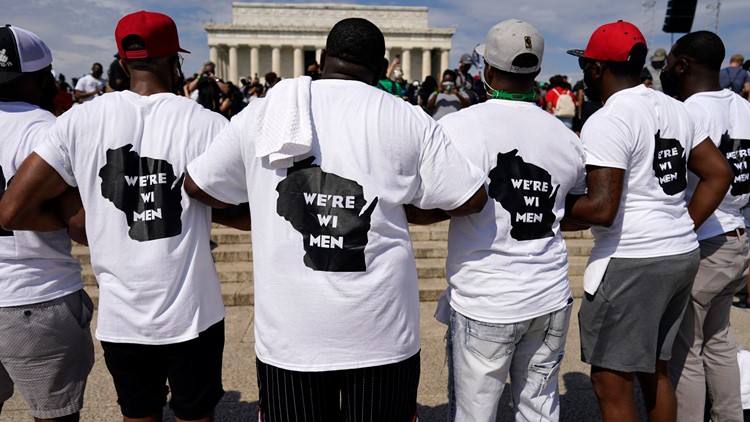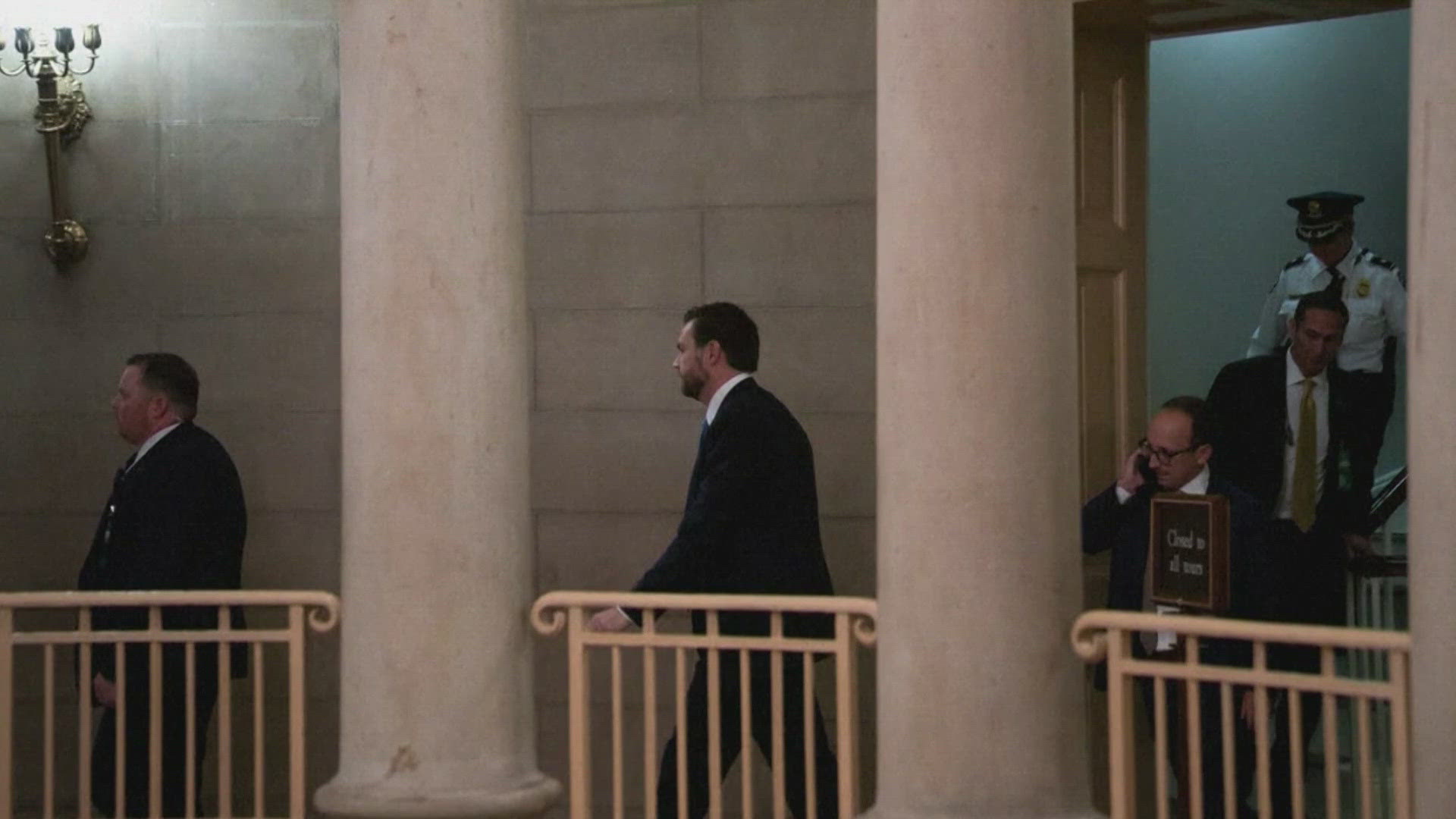The educator. The author. The politician. The reporter. They’re all back for another episode of Y'all-itics, three months after joining the Jasons for the podcast “My Skin is not a Weapon.”
It’s not lost on anyone that the shooting of another Black man in police custody frames the conversation… again. While there is a great deal of discouragement and frustration, this panel of African Americans does think some change, no matter how small, has taken root in the three months since.
But in another powerful conversation, they make clear we still have a long way to go. Subscribe where you get your podcasts (and continue reading for excerpts of their conversation):
On the events unfolding in Kenosha, Wisconsin:
Akela Renae, author: “Unfortunately, it’s one of 'here we go again.' This has happened yet again. You know, we all kind of rallied together after George Floyd. It’s like, we’ve got to do better. We’re gonna do better. And this just sets us right back. It’s… I have a feeling of disappointment and hurt. How it happened. The way it went down. It’s discouraging, at best, that we will never move forward, and Black men will continue to be targets in situations like this. I’m discouraged at this point.”
Demond Fernandez, WFAA reporter: “One thing that has happened since our last conversation is that I think the door has been opened for people to talk about some of their concerns and also listen to people who are part of groups who have been systematically marginalized or hurt groups and ask their perspective so they can get a better understanding. But when the dialogue becomes a debate, it makes you wonder whether or not people are truly opening themselves up to hear other people’s perspectives or if they’re trying to just use what they think are their objectives to try to change your voice.”
On the phrase "law and order":
Carl Sherman Jr., politician: “Law and order is a dog whistle as far as I’m concerned as a Black man in America. Law and order is a call to continue to oppress and suppress marginalized communities. And that’s, quite frankly, what it is. And the danger, unfortunately, as a person of color in America in this election cycle, Jason, is the reality that our Democratic nominee pushed the crime bill and has a former prosecutor as a running mate. Those are realities that you can’t overlook. Those are things that color their perspective, their American narrative.”
On the NBA boycott, followed by other professional sports leagues:
Carl Sherman Jr., politician: “The NBA players doing what they did yesterday shows that you can use your talents, your gifts, your God-given abilities to make a statement that’s loud and profound. The question now becomes for Black Americans, for brown Americans is do we allow this moment to pass us by. How do we actually get engaged and involved to implement policy change, not only on a national level, but on a local level because law and order, once again, does not speak to the reality in Black and brown communities.”
Akela Renae, author: “I agree with Demond, yes it’s a diversity lesson. However, if they were to continue and continue to hit people in the pocketbooks and not play, then you could probably get even more momentum. But the question remains, will they continue to do that. You see that the NFL has not. How many more teams do we need to stand together and take a stand and do that to where it starts to impact the dollars, that will possibly bring people back to have a legislative session to talk about how do we move forward?”
David James III, educator: “You know the NBA boycotting, or while it may feel good to have a lot of panel discussions about how to be anti-racist, until we have addressed the elephant in the room, which is the political landscape, the political atmosphere for a human issue, I think we’re going to continue to have the same issues.”
On whether they expected more change after the George Floyd killing:
Carl Sherman Jr., politician: “I think that we all felt for a brief moment that there would be more tangible results to come out of the unfortunate killing of George Floyd. I think what the Milwaukee Bucks said in their statement yesterday in calling on their legislators to have a special session, to call them back to office to do something. That is the type of change that should be evoked is policymakers coming, sitting around a table and actually enacting policy that will address the systemic issue that we have.”
David James III, educator: “We’ve been in these cycles before. And so just seeing some of the things that have taken place since this incident and some of the back and forth between what basically equates to, you know, political lines because you’ve got a lot of Republicans saying that leftists excuse criminals. And you’ve got a lot of Democrats that are saying that Republicans are insensitive for whatever reasons or they’re racists. We have really politically-charged a human issue. And so I think until we can get past the point where we make everything – or we politicize everything – I think we’ll be kind of in this, just, back and forth.”
On the city council vote to divert money from the Austin Police Department to other community programs, and the threat by state leaders to freeze property tax rates for cities who cut police budgets:
Carl Sherman Jr., politician: “The party that touts local control is now saying no, the state has control or should have control of this local issue. That’s all I will say with this, because I think to your point Jason, yes, battle lines have been drawn. But the battle line has moved into local communities when you have a state agency saying, you know, we disagree with what the local government is doing and therefore we’re going to penalize them with the lever that we control, which is the revenue capsule.”
David James III, educator: “We don’t have the same level of recourse that people had when they were acting on the Boston Tea Party and things like that, because we don’t have any of the power. And so, even something as egregious as that, that was really riotous in nature, is now looked back in history as one of the great, most memorable protests this country has even seen. And so when we act that way now, we’re looked at as violent. We’re looked at as destructive. We’re looked at as detracting from what the real issue is.”
On the positives they've witnessed since the last conversation:
Akela Renae, author: “More real conversations about what’s going on. After the last podcast, I had a couple of people that didn’t know my story, had never heard it, never even knew I experienced those things, have a real conversation with me about it. So it was more than, you know, just a ‘like’ on a page. It was real conversation.”
Carl Sherman Jr., politician: “I feel like a lot of people are awakened to what happens in some communities here in the United States of America. And so that was a great thing, a start of the conversation so to speak.”
David James III, educator: “We got some new verbiage. So we have ‘allies’ now. We have ‘anti-racism’ now. A plethora of other things that have come out of it, you know, from a verbiage perspective. What I’m looking for moving forward is the implementation. So what does an ally truly do? What does someone who’s anti-racist really look like?”
Demond Fernandez, WFAA reporter: “It’s been encouraging to see the promotion and support of Black-owned business after George Floyd. The restaurants, retail shops, I noticed there’s been a big push and that’s been encouraging. Also, another observation is seeing more and more people not afraid to call out individuals for problematic behavior. We’ve been seeing a lot of that across social media through video. Also, seeing that individuals in our community are willing and able to take the conversation outside the community and to the capitol.”



